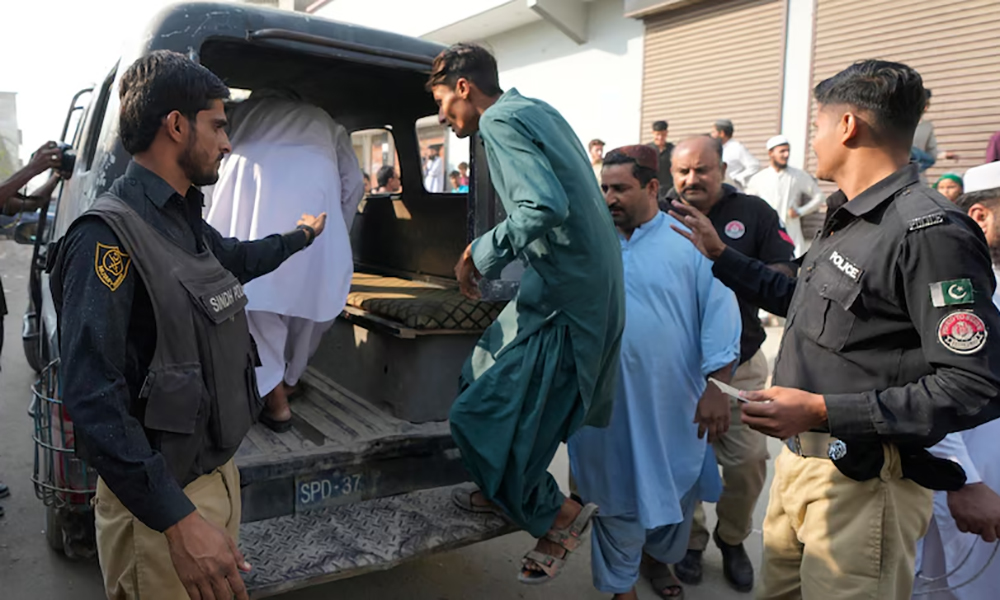Latest News
Amnesty international urges Pakistan to halt Afghan deportations
Amnesty International said that all Afghan nationals are required to leave the cities of Islamabad and Rawalpindi by 31 March

Amnesty International on Wednesday called on Pakistan to immediately withdraw its “Illegal Foreigners Repatriation Plan”, which primarily targets Afghan refugees, ahead of the authorities’ 31 March deadline.
Pakistani government has asked all “illegal foreigners” and Afghan Citizen Card holders to leave the country before March 31, warning they would otherwise be deported from April 1.
Amnesty International said that all Afghan nationals are required to leave the cities of Islamabad and Rawalpindi by 31 March
It said that “arbitrarily and forcibly expelling Afghan nationals, including refugees and asylum seekers, will only add to their plight”.
“The Pakistani government’s unyielding and cruel deadline, which is less than a week away, to remove Afghan refugees and asylum seekers from two major cities, resulting in the deportation of many at risk, shows little respect for international human rights law, particularly the principle of non-refoulement,” said Isabelle Lassée, deputy regional director for South Asia at Amnesty International.
The exact details of the Pakistan government’s ‘Illegal Foreigners Repatriation Plan’ used for deportations has never been made public, but it comes amid a campaign to wrongfully demonize Afghan nationals as so-called criminals and terrorists, Amnesty said.
Isabelle Lassée said that the Pakistani government is only making “a scapegoat of a community that has long been disenfranchised and fleeing persecution.”
Human rights lawyer Moniza Kakar pointed out that forcing Afghan refugees to relocate even within Pakistan is devastating for families. “Many PoR card holders are people who’ve been here for decades, asking them to relocate means you’re asking them to leave homes, businesses, communities and lives they’ve built for years,” she said.
Lawyer Umer Gillani, who has challenged the deportation orders in Pakistan’s Supreme Court and Islamabad High Court, argued that the March 31 deadline was not legally enforceable. “The official notification has not been issued under any particular law; it is just an executive instruction,” he stated.
Meanwhile, the International Organization for Migration (IOM) reported a sharp decline in Afghan returns and deportations during the first half of March. Between March 1 and 15, returns dropped by 67 per cent, while deportations fell by 50 per cent compared to the previous reporting period (February 16-28).
Latest News
Continued aid to Afghanistan vital for regional security: Kazakh president

Kazakhstan’s President Kassym-Jomart Tokayev has emphasized the continuation of humanitarian assistance to Afghanistan, stating that the ongoing provision of such aid plays an important role in ensuring regional security.
Speaking at the international conference “Peace and Trust” in Ashgabat, the capital of Turkmenistan, Tokayev described addressing complex humanitarian challenges and the reconstruction of Afghanistan as a necessity.
“To ensure regional security, we consider it essential to continue providing assistance to Afghanistan, including by strengthening international efforts to address complex humanitarian issues and the reconstruction of this country. Kazakhstan remains committed to supporting the people of Afghanistan through humanitarian aid, educational projects, trade development, and food security initiatives,” he said.
Meanwhile, experts believe that sustainable improvement of the humanitarian situation in Afghanistan requires broad cooperation from the international community and support for the country’s economic development.
“Investment can be defined as one of the fundamental drivers of the economic cycle, and whenever Afghan traders do not take their money out of the country and instead invest domestically, it naturally leads to greater growth and dynamism in Afghanistan’s economy,” said Abdul Zahoor Modabber, an economic analyst.
As the humanitarian crisis in Afghanistan continues, reports by international relief organizations indicate that millions of citizens of the country are in urgent need of food, health, and livelihood assistance.
The reduction in funding for aid organizations, the impacts of climate change, and the return of migrants have increased concerns about a further deterioration of the humanitarian situation in the country.
Latest News
Islamic Emirate declines to attend Tehran meeting on Afghanistan
Latest News
Sirajuddin Haqqani: A government that intimidates its people is not a true government

Khalifa Sirajuddin Haqqani, Minister of Interior of the Islamic Emirate of Afghanistan, said during a visit to Khost province on Friday that any government which rules through fear cannot be considered a true government.
“A government is one that is loved by its people, one that serves them with respect and compassion, and from whose behavior people learn ethics and sincerity,” he said.
Haqqani also stressed that Afghans who opposed the Islamic Emirate in the past should be tolerated and treated in a way that helps eliminate hostility and animosity, paving the way for national cohesion.
-

 Latest News2 days ago
Latest News2 days agoMuttaqi: Afghanistan’s progress requires both religious and modern education
-

 Sport4 days ago
Sport4 days agoILT20: Desert Vipers edge Gulf Giants in historic super over thriller
-

 Regional4 days ago
Regional4 days agoSix Pakistani soldiers killed in TTP attack in Kurram District
-

 Business4 days ago
Business4 days agoTrade bodies warn almost 11,000 Afghan transit containers stuck at Karachi port
-

 World4 days ago
World4 days agoPowerful 7.6 earthquake hits northern Japan, tsunami warnings issued
-

 Latest News3 days ago
Latest News3 days agoTrump calls Afghanistan a ‘hellhole’ country as US expands immigration restrictions
-

 Sport3 days ago
Sport3 days agoCommanding wins for Arman FC and Sarsabz Yashlar in Afghanistan Champions League
-

 Latest News5 days ago
Latest News5 days agoPakistan’s top general calls on IEA to pick between ties with Islamabad or TTP

























